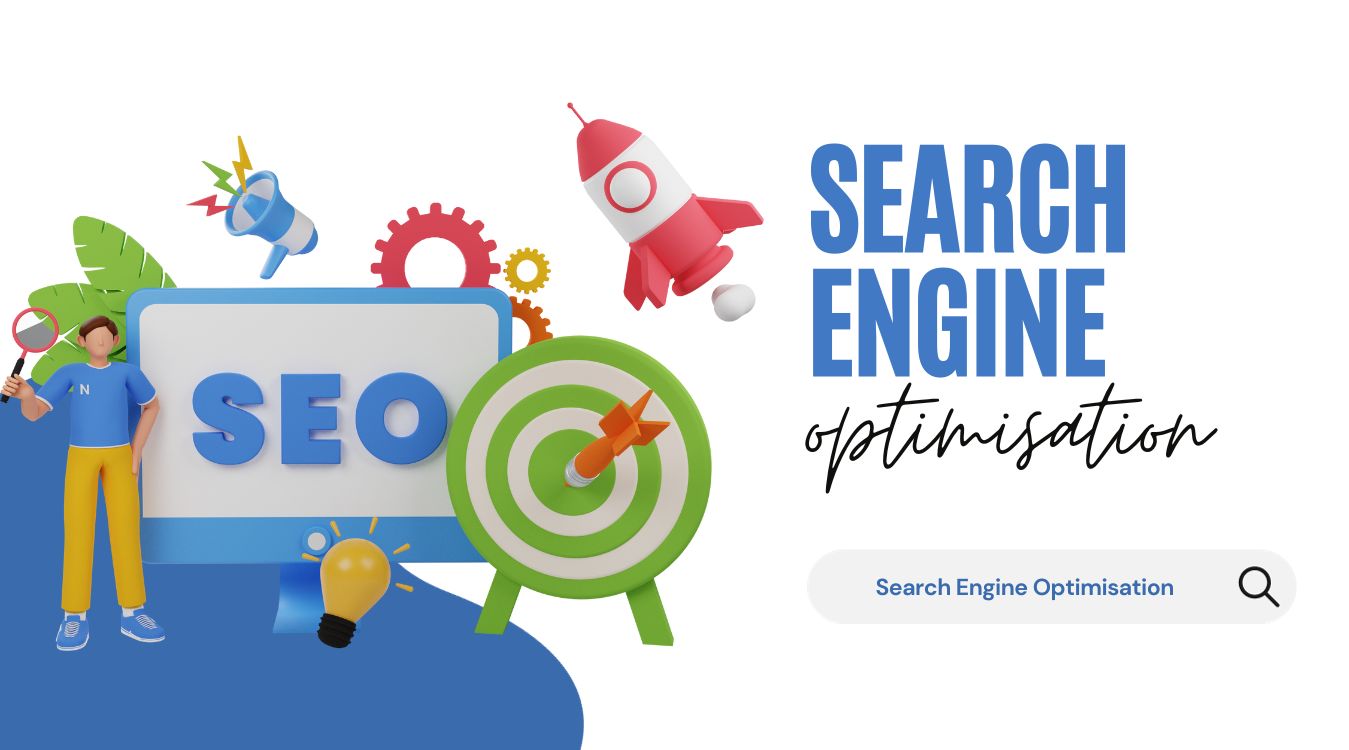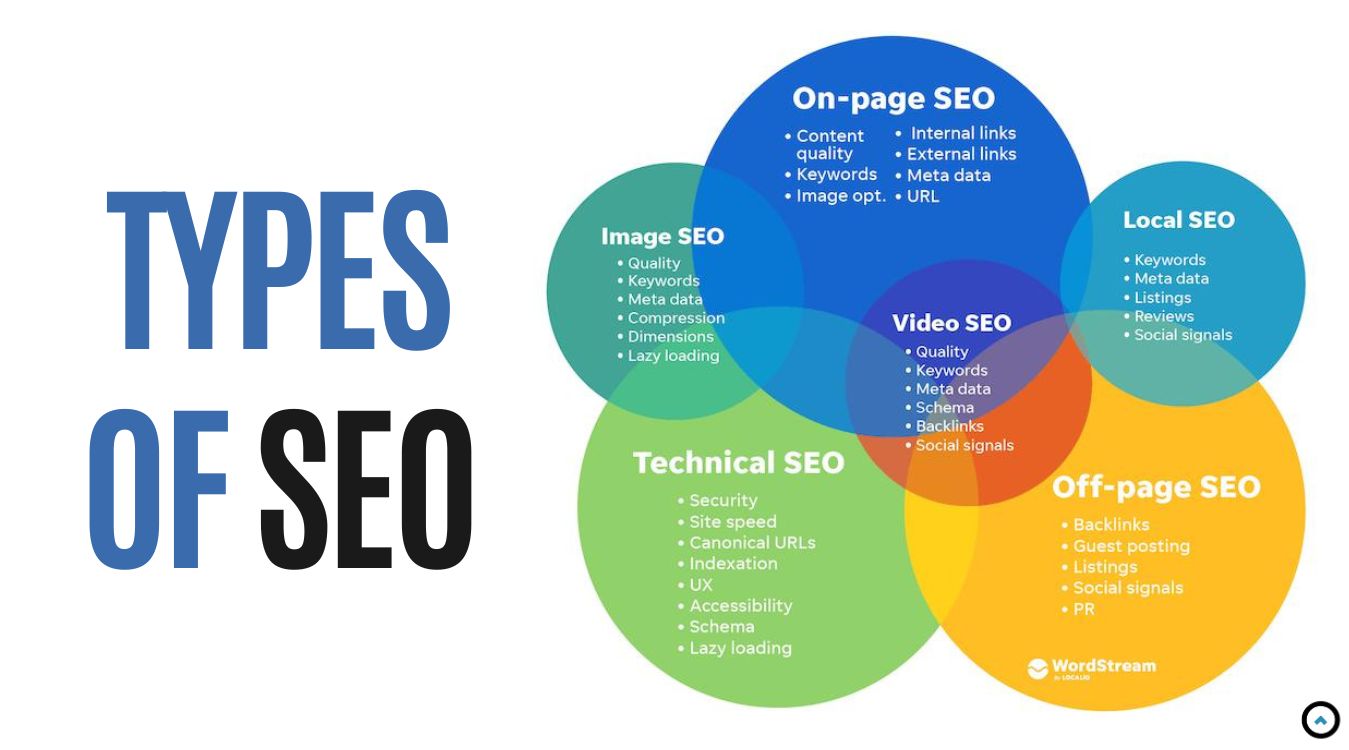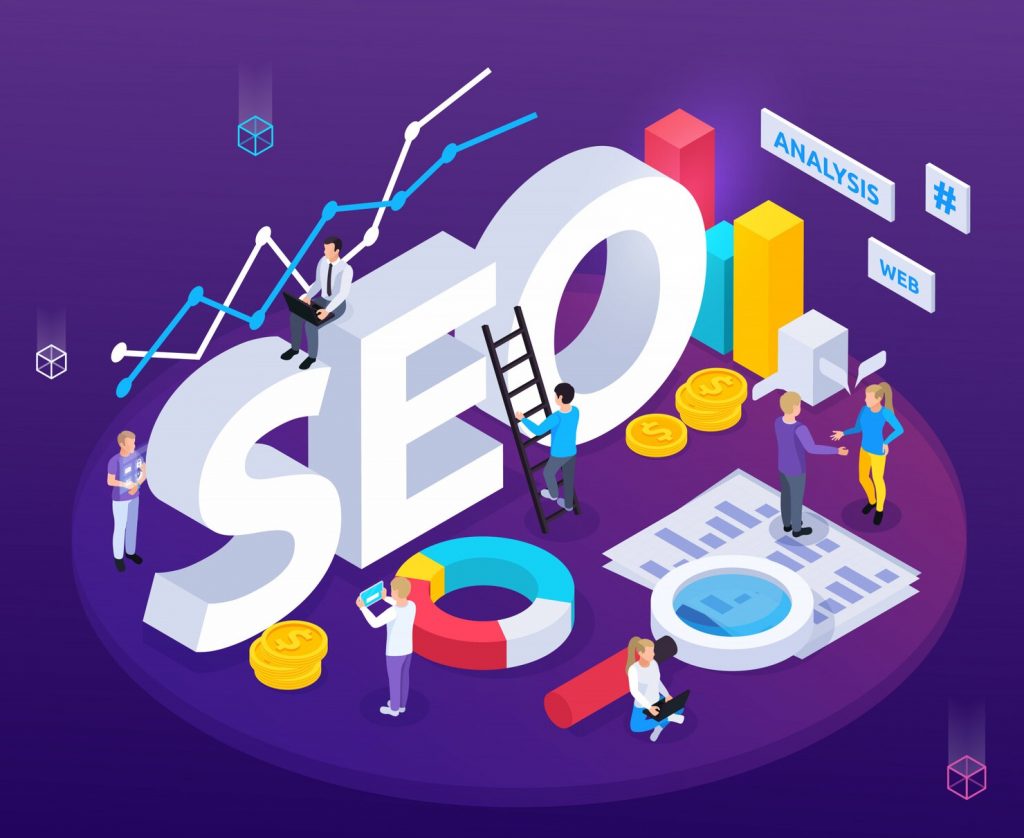For any company or website to succeed in the digital era, having a strong online presence is essential. A key factor in doing this is Search Engine Optimization (SEO). In order to improve a website’s exposure on search engines like Google, Bing, and Yahoo, SEO firms employ a variety of tactics and strategies, such as ON-page SEO and OFF-page SEO, to improve ranking for particular queries. SEO helps improve the visibility and ranking of a website on search engine results pages (SERPs).
In this thorough tutorial, we’ll dig into the realm of SEO services and examine what they comprise, why they’re important, and how they may help your online business.
What are SEO Services?
SEO, Search Engine Optimization, is the process or technique used to improve the performance of websites. A wide range of operations are included in SEO services with the goal of enhancing a website’s organic (non-paid) search engine rankings. The goal of SEO services is to claim a prominent position in those search results when users search for particular terms or phrases related to your business. It will extend your audience and promote more user interaction.

The creation of quality content with well- researched keywords related to your company or business is one of the sub-strategies that fall under the umbrella of this digital marketing package. In addition, SEO requires the careful optimization of technical elements like the underlying code of your website, page load times, and mobile responsiveness, all of which contribute to a seamless user experience.
You can get SEO services for your website from digital marketing agencies, consultants, or freelancers to attract more organic traffic and earn more revenue. Most SEO experts provide SEO plans that encompass on-page, off-page, technical SEO, and off-page SEO as a complete package. You can learn more about SEO packages suitable for your particular website by contacting us at +1 (917) 608 0404.
Types of SEO
SEO is essential for creating organic traffic, which is a valuable resource for online businesses. According to studies, users frequently choose the top search results shown by search engines when starting their digital search for goods or services. These first-page results are a product of the right SEO work that guarantees not just their exposure but also the caliber and relevancy of their material.

To rank websites at the top, different SEO services are used, each with its own focus and objectives.
1. Local SEO:
The techniques are applied to enhance the appearance of the website in local search results on Google. By doing so, businesses will easily reach the local audience by observing users’ searches. It includes:
- Local Keyword Optimization: Targeting keywords specific to your local area.
- Google My Business Optimization: Optimizing your Google My Business listing for local searches.
- Local Citations: Building consistent business listings across online directories and platforms.
- Customer Reviews: Encouraging and managing customer reviews and ratings.
2. E-commerce SEO:
This technique is used to enhance the position and visibility of online stores or e-commerce websites. It results in higher sales and greater revenue.
- Product Optimization: Optimizing product descriptions, images, and categories with relevant search terms for e-commerce websites.
- User Experience Enhancement: For a better user experience, navigation, site structure, and checkout processes are all improved. User-friendly website design will be given importance.
- Competitor Analysis: Analyzing competitor strategies and identifying opportunities for improvement.
Here we will explain the standard SEO services that are preferred by most SEO specialists.
3. On-Page SEO:
This is the technique in which onsite elements of the website are optimized to attract organic traffic. It generally includes:
- Keyword Research: Identifying relevant keywords and phrases that users are searching for and adding them to content.
- Content Optimization: Creating high-quality, informative, and keyword-rich content that is user-friendly and SEO-friendly.
- Meta tag Optimization: Optimizing meta titles and descriptions with relevant keywords for search engines and users.
- Header Tag Optimization: Properly structuring headers (H1, H2, H3, etc.) for content hierarchy.
- Image Optimization: Optimizing image files for faster loading times with alt tags and captions to improve user experience.
- Internal Linking: Adding proper internal links to improve navigation among relevant pages.
4. Off-Page SEO:
It is the practice of optimizing the website based on its external factors. In general, these include:
- Link Building: In order to enhance the authority level of the website, high-quality backlinks from authoritative and relevant websites are acquired.
- Social Media Marketing: Using and optimizing social media platforms to increase brand visibility and engagement.
- Online Reputation Management: Improving the online reputation of a website or business through reviews and content promotion.
- Influencer Outreach: Cooperating with industry influencers to achieve exposure and credibility.
- Guest Blogging: To improve website authority, writing blogs for other platforms, including self-website links in exchange, comes under this.
- Competitor Research and Analysis: Improving SEO by analyzing the backlinks, keywords, and content of the competitors.
5. Technical SEO
In this, optimization of the website is done so that it can be easily crawled and indexed.
- Website Speed Optimization: Boosting the loading speed of the website for a better user experience.
- Mobile Optimization: Ensuring your site is mobile-friendly, responsive to all types of screen sizes and easy to navigate on all screens.
- Crawlability and Indexability: Make sure search engines can crawl and index your site’s pages effectively.
- Schema Markup: Implementing structured data to provide context to search engines.
- Robots txt: A robots.txt file tells search engine crawlers which URLs the crawler can access on your site. This is used mainly to avoid overloading your site with requests.
- XML Sitemaps: Creating and submitting sitemaps to search engines for efficient indexing.
6. Content Marketing SEO:
Creating unique, SEO-friendly and user-friendly content that can deliver useful information. It can be in the form of blogs, videos, graphics, or any other form of writing. It generally includes:
- Content Strategy: Creating a content plan that aligns with SEO goals and user interests.
- Blog Management: Optimizing and creating blog content to attract and engage visitors
- Guest Posting: Publishing content on authoritative websites with their own website links to enhance the SERP’s positioning.
- Content Promotion: Sharing of quality content through various available channels to reach a wider audience.
How do Search Engines Rank Websites?
To get answers to their questions, people use search engines. Search engines use their algorithms, which are a set of computer programs, to provide relevant results to the searchers by matching the texts. Also, this algorithm decides which page will rank at the top. Behind all these are three steps that are followed by search engines. Namely, they are crawling, indexing, and ranking.
Search engines send different crawlers to find what is new on the internet and then record all the information. These crawlers are also termed as spiders or robots. They keep checking the new pages and also check previously visited pages to see if any changes or updates have been made. In order to scan the internet and index web pages, search engines use crawlers or spiders.

Search engines also give preference to off-page SEO factors, such as authority and credibility. Google analyzes the amount and quality of backlinks coming from other trustworthy websites to determine the authority of a page. Backlinks from authoritative sites are counted as “votes of confidence” by other internet sources. Good-quality backlinks are considered by search engines in deciding the ranking of the page.
The search engine algorithms keep changing, so regular SEO practices or strategies need to be implemented on the website to secure its position on the SERP and boost the user experience.
How Much Does SEO Services Cost?
The price of SEO services can vary significantly based on a number of variables, such as the volume of work, the level of industry competition, the size and standing of the SEO firm or specialist, and your individual objectives. Various pricing structures, including hourly rates, monthly retainers, and one-time project costs, are frequently used to deliver SEO services.

- Hourly Rates: Many SEO experts bill their clients on an hourly basis. The hourly costs might vary from $75 to $200 or even more, depending on the SEO provider’s level of experience and location. Beginners or independent contractors could bill at the lower end of this spectrum, while experienced firms or consultants might bill at the upper end.
- Monthly Retainers: For continuing SEO services, monthly retainers are a typical pricing structure. Depending on the quality of service and the size of your website, a monthly retainer might cost dramatically different amounts. Smaller companies may spend $500 to $2,000 each month, whereas larger companies with more intricate SEO requirements may spend $5,000 to $10,000 or more monthly. With OBCIDO you will get the best monthly SEO packages.
- One-Time Projects: Some SEO services, such as website audits, keyword research, or site migrations, are provided as one-time projects. Depending on the difficulty and size of the job, the price might be anywhere from $1,000 to $10,000 or more.
Typical Monthly USA SEO Service Costs
| Level of Service | Cost Range Monthly (Approx.) |
| Small Business SEO | $500 - $2,000 |
| Mid-sized Business SEO | $2,000 - $5,000 |
| Enterprise SEO | $5,000 - $10,000+ |
| Local SEO | $500 - $1,500 |
| National/Global SEO | $2,000 - $10,000+ |
| E-commerce SEO | $1,000 - $5,000+ |
| Content Creation & Link Building | $1,000 - $5,000+ |
| Website Audit | $1,000 - $3,000+ |
***These prices are just for informational purposes. They will change according to the SEO cost factors.
Benefits Of SEO For Your Business
SEO may benefit your company in a variety of ways. More individuals will be able to locate your company online as a result of your website appearing more frequently on Google and other search engines. This may result in more clients and more success for your business.

| SEO Benefit | Description |
| Increased Visibility | SEO improves your website's ranking in search engine results, making it more visible to users. |
| Higher Organic Traffic | Improved rankings lead to more organic (non-paid) traffic to your website. |
| Cost-Effective | Compared to paid advertising, SEO is a cost-effective way to attract targeted traffic. |
| Better User Experience | SEO involves optimizing your website for user-friendliness, leading to a better user experience. |
| Credibility and Trust | High-ranking websites are considered trustworthy and credible by users. |
| Higher Conversion Rates | Targeted traffic from SEO is more likely to convert into leads or customers. |
| Competitive Advantage | Outranking competitors in search results can give you a competitive edge. |
| Improved Mobile Experience | SEO includes mobile optimization, crucial for reaching users on mobile devices. |
| Long-Term Results | SEO efforts can provide lasting results, unlike some short-term marketing tactics. |
| Analytics and Insights | SEO tools provide valuable data to track and analyze website performance. |
Powerful Google/Yahoo/Bing Ranking Factors

1. On-Page Google Ranking factors
- Quality Content: You have never heard anyone say, “No quality content is required for my website”. And it is very obvious why. Still, the content of the webpage is considered the king and it should be of high quality. The content should be able to deliver valuable and useful information to the reader. Creating content without valuable information is of no use. Google also keeps updating its algorithm and its preference is only for high-quality content so that the user experience gets better. The content should also be relevant and revolve around the service or product you are delivering to your customers. It should be well written by using long tail and short tail keywords so that visitor time on the page increases and the bounce rate drops. In total, content plays an important role in attracting organic traffic to the website and determining the page’s ranking.
- Keyword Optimization: Use relevant keywords naturally in your content, including in titles, headings, and throughout the body text. Avoid keyword stuffing, as this can result in penalties.
- Image optimization: Use of alt tags and descriptive file names to properly optimize images.
On-page SEO is a critical aspect of a holistic SEO strategy. When combined with off-page SEO (which focuses on factors like backlinks and social signals), technical SEO (related to website structure and performance), and local SEO (for businesses targeting local markets), it helps improve a website’s visibility in search engine results and attract more organic traffic.
2. OFF-Page Google Ranking Factors
Off-page Google ranking factors are elements and strategies that influence a webpage’s search engine ranking based on factors external to the webpage itself. These factors primarily involve the reputation, authority, and popularity of a website as determined by the broader online community. Here are some key off-page ranking factors:
- Backlinks: Search engines keep an eye on all links (internal and external) that point to any website. Websites that have amazing, trustworthy, and relevant content get requests from other websites to add their website links. Search engines look at these links and also consider the value of those links. Also, all links have equal value. For example, if your website is based on carpet cleaning and other high-authority same-category websites link to your blog, then Google will examine your content as being of high quality and authoritative. Whereas if any artificial intelligence blog links to your blog, it will not be considered highly authoritative by Google. Thus, it’s very important to pay attention to the quality of the links you are adding to your website.
- Social Signals: Social signals, such as likes, shares, and comments on social networking sites, can indirectly affect your SEO even if they are not a direct ranking element. They can boost your online presence, raise brand visibility, and generate visitors to your website, all of which can improve your search engine results.
- Guest Blogging: Posting good quality content on other websites in the same business area as a guest contributor, is called guest blogging and is an essential ranking factor. The aim of this technique is to offer quality content to different audiences while getting backlinks for your own website too.
- User Engagement: Websites with high levels of user engagement, such as longer dwell times and lower bounce rates, may be perceived as more valuable by search engines.
- Brand Mentions: Online mentions of your brand or website (even without a hyperlink) can contribute to your online reputation and authority. Off-page SEO requires constant monitoring and management of brand mentions.
- Press Releases: Distributing well-crafted press releases can result in media coverage and mentions, enhancing your online presence.
3. Technical SEO Ranking factors
The coding part of your website also plays a role in determining the SEO score. If you have well-written and high-quality content on your website but it is not presented correctly, then it is of no use. You should add targeted key phrases to the title of the page. The header tag should be mentioned properly, starting with the title, then h1, h2, and so on. Meta tags should be created with keywords and remain inside the guided character limit. Also, every image should have an alt tag and that alt tag should be relevant. Improving these things will result in a higher click rate and thus the ranking goes up.
- User Experience: If you are not paying attention to the user experience, then your website will never reach the top position. It is well known that no one will engage with a website that is unattractive or difficult to explore. If you do this in the right manner, then your website will definitely experience ranking and positioning benefits. Improving the speed of the page, easy navigation, making the website mobile friendly, and no pop-up notifications—all these things come under improving the user experience. Visitors to your website will find it easy to digest the content and can easily find the points that they are after, which will make them visit your site again and again. This will increase your website’s visibility and improve your SEO score.
- Page Speed: How quickly your web pages load for users is referred to as page speed. Faster page loads are beneficial to search engines’ priority of providing a positive user experience. As a result of keeping visitors on the page longer and lowering bounce rates, quicker websites frequently rank better. The slower loading time of the webpage will result in a loss in terms of revenue as well as ranking.
- Secure Website: A secure website using HTTPS encryption is essential for SEO since it not only safeguards user data but also helps your website rank well in search results. When your website uses HTTPS, it makes sure that all data transferred between visitors is safe and encrypted. Google, the most popular search engine, takes website security into account when determining rankings. Search engines prioritize user safety and trust, so websites that employ HTTPS typically rank better.
- Mobile Friendly: It is essential to have a mobile-friendly website, as the use of mobile devices is increasing day by day. Google also considers this a ranking factor as it comes under enhancing the user experience. Your website will be accessible and usable on smartphones and tablets if it has a responsive design that adjusts to multiple screen sizes, which can improve your search engine results.
4. Local SEO Ranking factors
Local SEO focuses on making your website more visible to users in your local area. It becomes important if you have a physical location or cater to a particular region. Google My Business accounts must be created, optimized, and managed, along with online reviews and the consistency of business information across online directories. Your company may benefit from local SEO efforts to show up in maps and local search results, drawing in clients in the area. Here are some of the key local SEO ranking factors to consider:
- NAP Citations (Name, Address, Phone Number): Ensure your NAP information is consistent and accurate across online directories, websites, and social media profiles. Submit your business to local citation sites and directories (e.g., Yelp, YellowPages, TripAdvisor, industry-specific directories).
- Google Maps Integration: Embed Google Maps on your website to help users find your physical location easily.
- Local Schema Markup: Implement structured data (schema markup) to provide search engines with specific information about your business, such as operating hours, location, and reviews.
- Google My Business (GMB) Optimization, Local Keywords, Online Reviews and Local Business Listings and Directories
Local SEO is crucial for brick-and-mortar businesses and service providers looking to attract local customers. By optimizing for local search, you can improve your visibility in local map packs and organic search results, ultimately driving more foot traffic and online conversions. Keep in mind that staying consistent with your efforts and monitoring your local SEO performance is essential for long-term success in local search rankings.
Your SEO won’t succeed or fail based on a single ranking element. It’s the combination of all your technical, on-page, and off-page efforts that work together to help you rank higher on search engine results, get more traffic, and build trust.
Before delving into the top 10 Google ranking factors that can be used to enhance your website pages, let’s start by knowing the top SEO ranking factors:
- On-page SEO, one of the SEO ranking factors focuses on website optimization. Quality content optimized with targeted keywords, and meta descriptions all fall under this.
- Off-page SEO ranking factors are like getting recommendations from other websites. It’s mainly about having links from other sites that point to your site.
The next, Technical ranking factor measures your site’s ability to be crawled, indexed, and rendered quickly and safely for searchers.
The local SEO ranking factor is simply the combination of the above-mentioned factors, giving preference to reviews, reputation, and listings.
Services Offered by SEO Companies

- SEO Audit: Before implementing any technique or strategy, it is very important to know the current positioning and condition of the website. This comes under the audit process. Our SEO experts first analyze the whole website using website analytics and prepare statistics mentioning traffic on the website, load speed, and ranking keywords. This phase is generally the planning stage for determining what things on a website need improvement or what things should be removed. A proper SEO audit report is prepared considering technical issues, website structure issues, On-page issues, off-site problems, and content issues. Competitors’ websites are also analyzed so that proper strategies can be made and better topics or sections can be added to the website to improve the user experience and SEO score.
- Competitor Analysis: It is the study of top-ranking websites or competitors for the same service domain. They look into the keywords that your competitors are ranking for, the backlinks they have, and the technical aspects of their websites and content. In order to improve the SEO approach for the client’s website, they understand the achievements and mistakes of the competitors’ websites. It is a technique to maintain an advantage in the digital race by modifying the strategy depending on what is effective for others in the same industry.
- SEO Strategy: Once the current situation of the website is properly analyzed, next comes preparing the strategy to enhance the website’s search engine visibility and get the expected results. All the needed information would be available in the audit report, such as targeted keywords, audience, location, and so on, to create the strategy. Both long-term and short-term strategies would be created. A step-by-step plan will be created and the expected result will be mentioned in front of it. Strategies should be broken down in an effective manner so that they can be implemented practically. There is no benefit to rushing things. If you need to know more about the SEO strategy for your website, you can easily discuss it with our experienced SEO professionals.
- Keyword Research: Identify relevant search terms and phrases to target in content and optimization strategies. A list of keywords that are worth targeting in your SEO efforts. These keywords will guide your content creation, on-page optimization, and overall SEO strategy to help you reach the right audience and improve your website’s visibility in search results.
- Content Creation: Creating engaging and relevant content, such as articles, videos, or infographics, to attract and engage website visitors. A list of keywords that are worth targeting in your SEO efforts. A library of high-quality content that not only informs and entertains your audience but also helps improve your website’s search engine rankings. Content creation is an ongoing process to keep your website fresh and relevant in the eyes of both users and search engines.
- E-commerce SEO: Tailoring SEO strategies for online stores to enhance product visibility, improve the user experience, and boost sales through optimized product listings and descriptions come under this. E-commerce websites face unique challenges and opportunities. With countless online stores competing for customer attention, it’s crucial to stand out in search results to attract potential buyers with e-commerce SEO.
- Mobile SEO: Ensuring websites are mobile-friendly for a better user experience on smartphones and tablets, including fast load times and responsive design.
- Voice Search Optimization: Optimizing websites for voice-activated devices with natural language keywords, structured data, and content that aligns with voice search queries.
- SEO Analytics: Tracking website performance, user behavior, rankings, and traffic using analytics tools to refine SEO strategies and measure optimization progress.
- Online Reputation Management: Managing online reviews and ratings to cultivate a positive brand image, including monitoring, responding to feedback, and enhancing the business’s online reputation.
- Link Building: Link building is an important service offered by SEO professionals to build connections with the internet. SEO professionals work to get trustworthy, quality backlinks to your website from other highly authoritative websites. These backlinks assist your site in moving up the search engine results by expressing trust in its authority and relevance. Link-building techniques include reaching out to other website owners, guest blogging, using content marketing, and producing shareable, quality content that adds links on its own. Essentially, it involves growing the internet network and reputation of your website.
- Monthly Performance Report: A report will be shared on a monthly basis with the clients to make them aware of the performance of the website on search engines. Traffic, ranking, and other domain values will be mentioned clearly so that clients can easily track the progress. This report gives the client an idea of what their hired agency is doing and helps them understand the outcome of their money spent on SEO services. There would be insight, progress, and certain recommendations in the report so that things could be made much better.
- GSC and Google Analytics Setup: The SEO company starts to follow the planned strategies so that changes can be made to the position of the website. The problems or issues that are identified during the audit will begin to be solved from here. SEO companies will start finding keywords relevant to businesses and locations through SEO campaigns. Setup with Google Search Console and other tools, such as Google Analytics, will be done. If any changes are required in the structure of the website or if it needs to be made mobile-friendly, professionals start working on that.
- Social Media Integration: The seamless connection of your website with different social media platforms is provided by an SEO company. This integration has a number of advantages. The first benefit is that it contains social sharing icons on your website, allowing users to easily share your content on their own social networks and thus expanding your audience. It also shows real-time social media feeds on your website, keeping visitors informed of your most recent interactions and updates. Additionally, it could have features like social login, which makes it easier for people to register by letting them join up using their social network credentials.
- Monthly Maintenance: SEO is a continuous process that needs to be done on a regular basis. A reliable SEO agency will focus on providing long-term results by following the watch, track, and maintain rules. This ensures that websites continue to remain in the top positions and continue to generate good revenue for the website owner. Also, the algorithms of search engines change at regular intervals. They get changed after a certain duration and ranking factors change. SEO specialists will look after that and work according to the changed algorithm. The SEO company aims to find better ways to keep the site in the top position.
- SEO Consultation and Training: A professional SEO agency offers consultation, training, and advice on how to keep your website healthy and competitive online. Also, they can analyze the current situation of the website and suggest recovery plans for its condition. To make your website more “friendly” to search engines, they could recommend making modifications to the content you use, what keywords to use, the way you organize your pages, or even technological changes. It gives you the power to control how well your website performs in search results.
How to Choose the Right SEO Service Provider

- Define Your Goals: You must be very clear about your SEO goals and objectives before you begin your search for an SEO service provider. Do you want to promote online sales, increase organic traffic, improve search engine results, or strengthen your brand’s online presence? You may select a service that meets your needs by having clear goals in mind.
- Conduct Research: Begin by conducting internet research on various SEO service companies. Check out their client testimonials, ratings, and reviews. To determine if they have experience in your business or area, pay close attention to their case studies and success stories.
- Assess Their Expertise: Verify the SEO provider’s knowledge and experience. Look for evidence of their expertise, such as articles, awards, and industry certifications.
- Evaluate Services Offered: There are several SEO service companies. While some may concentrate on off-page strategies like link building, others may concentrate on on-page optimization. Verify that the services they provide support your objectives. Keyword research, on-page optimization, content production, link building, and technical SEO are often components of an effective SEO plan.
- Ask for a Quote: Contact the SEO service providers you are interested in and ask for a comprehensive proposal. The proposal should include the strategy for SEO, the particular services they will offer, a schedule, and the expected outcomes. Expenses and fees should be mentioned in it as well.
- Communication and Reporting: Ask them about the performance-tracking methods and metrics they employ. It’s important for reporting to be transparent so you can gauge how their efforts are impacting the performance of your website.
- Discuss Strategies and Transparency: Confirm that the SEO service provider adheres to ethical and professional SEO techniques. Black-hat techniques should be avoided since they may face penalties from search engines. If they have any links that can jeopardize your interests, find out how they manage any conflicts of interest.
- Evaluate Costs: The price of SEO services might vary greatly. Avoid picking an agency purely on the basis of cost. Instead, concentrate on the SEO benefits they provide and the possibility that you will succeed. Take into account both one-time fees and recurring monthly costs.
- Trust Your Instincts Take your time when making a choice. Compare several SEO service companies, taking into account both their advantages and disadvantages. This will assist you in making a decision that is in line with your corporate goals.
Comparing SEO to SEM and PPC
| Aspect | SEO (Search Engine Optimization) | SEM (Search Engine Marketing) | PPC (Pay-Per-Click) |
| Traffic Source | Organic search results | Both organic (SEO) and paid (AdWords, Bing Ads) search results | Paid search results (advertisements) |
| Cost | It generally involves upfront costs for SEO services and content creation but no ongoing cost per click (CPC). | The cost varies based on the advertising budget and CPC for paid ads. | Advertisers pay for each click on their ads; costs can add up quickly. |
| Timing | Results may take time, often several months, for noticeable improvements. | Immediate results can be achieved once ads are set up and running. | Immediate results as long as the campaign is active and the budget is available. |
| Complexity | Involves optimizing website structure, content, and user experience; it requires ongoing monitoring and adjustments. | Managing SEM campaigns can be complex, involving keyword research, ad creation, and bid management. | Setting up PPC campaigns requires keyword selection, ad creation, bid management, and monitoring for effectiveness. |
| Platforms Used | Google, Bing, and Yahoo (organic search results). | Google Ads (formerly AdWords), Bing Ads, and Yahoo Gemini (paid search results). | Google Ads, Bing Ads, Facebook Ads, and Twitter Ads (various advertising platforms). |
Unlock Your Digital Potential with OBCIDO’s SEO Expertise
Navigating the wide expanse of the internet can be difficult in a fast-paced digital environment. In response, OBCIDO offers you a ticket to success with our top-notch SEO techniques. With our assistance, you may enjoy the spotlight, see an increase in organic traffic, and achieve your digital marketing goals.

At OBCIDO, we don’t just follow trends; we set them. Our dedicated team of SEO experts understands the intricate workings of search engines, and we use this knowledge to elevate your online presence. With a proven track record and a client satisfaction rate that speaks volumes, we proudly stand among the best SEO service providers. We optimize your online presence to drive conversions and ensure a robust return on investment.
Don’t let your digital potential go untapped. Contact OBCIDO today and experience the power of organic traffic like never before. Success is just a call away!





